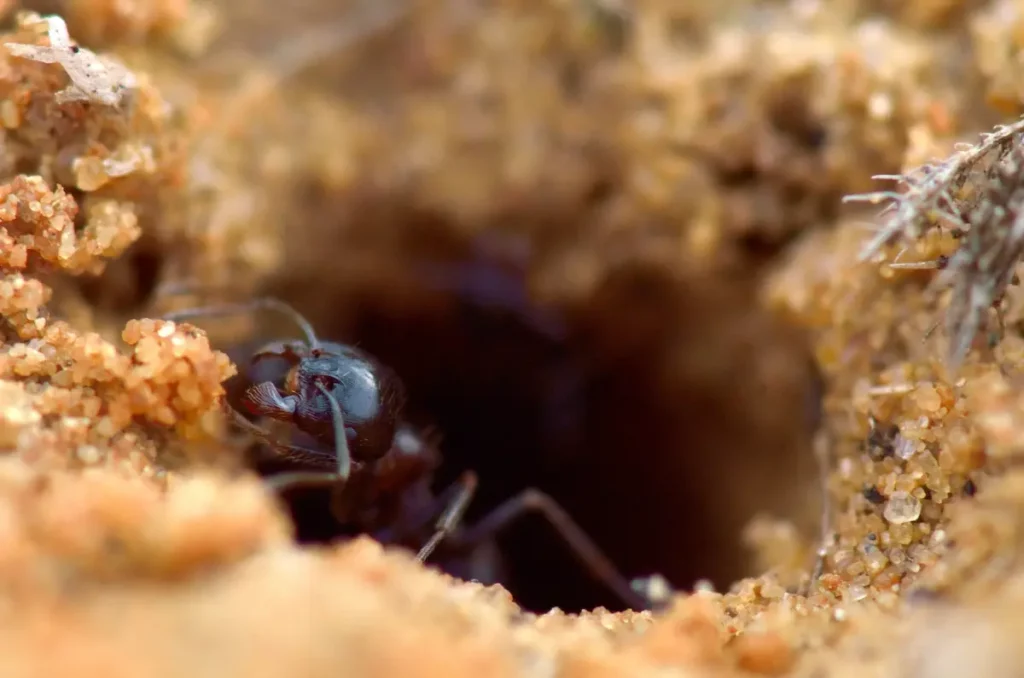Using bleach to kill ants may not be the best solution for getting rid of them.
While it can kill the ants that have been exposed to it, it won’t eliminate the ant nest, leaving you with an incomplete solution.
Moreover, using bleach can be hazardous to your health, so it’s essential to use caution when handling it.
Ants entering your home is a common issue.
They may seek food or water or find a warmer and drier location.
Ant bait and bleach are effective ways to eliminate ants in your home.
If you want to use bleach on ants, read this guide. We will also provide solutions to prevent them from entering your home.

Related Reading: Does Bleach Kill Millipedes?
Table of Contents
Best Ways of Using Bleach to Kill Ants
When you observe an ant closely under a microscope, you’ll notice that their bodies have tiny pores that can close to prevent water from entering.
For this reason, if you spray an ant with water, it won’t harm them.
However, if you spray an ant with bleach, these pores will remain open, allowing the bleach to enter their body and cause harm.
It all comes down to the vapor of bleach. Ants can close their holes to liquid but not to gas.
The holes in the ants’ exoskeleton don’t close, so when bleach is applied, it seeps into the ant’s internal structure.
As a result, the bleach burns the ants from the inside and releases chlorine gas, which kills them. In the end, you are left with dead ants.
There are several ways of using bleach to kill ants.
Bleach with Ant Bait
Apply bleach to ant bait.
Ants ingest it with the bait, causing death.
You can use honey to attract the ants with a bleach mix for a natural bait.
Bleach Spray
You can create a robust bleach solution by mixing bleach with water to eliminate ants.
Pour the solution into a sprayer and apply it directly onto the ants.
If you’re applying the solution indoors, ensure the area is well-ventilated.
The fumes from the bleach can be overwhelming, so take the necessary precautions.
Bleach Wipe
To remove ants, take a cloth and soak it in bleach.
Use a cloth that you don’t mind being discolored by bleach.
Next, rub the bleach-soaked cloth over the ants.
However, this method can be uncomfortable for some people as they will feel the ants being squished under the cloth.
If you are sensitive to this kind of thing, avoiding this method is best.
Bleach with Hot Water
Combining boiling water and bleach is an effective solution to eliminate ants.
Pour the mixture over the ants to eliminate them.
Why Using Bleach to Kill Ants is Temporary
Talking to pest removal experts reveals using bleach to kill ants is only a temporary solution.
You can eliminate visible ants, but those in the nest remain unaffected.
When they emerge, repeat the bleaching process.
This method will take a lot of patience and time to get as many ants as possible.
Attacking the nest is crucial, but bleach is ineffective.
Complete eradication is necessary.
Health Issues Associated with Using Bleach
If you have health issues, bleach can worsen them, especially respiratory problems.
You may also experience skin irritation, rashes, headaches, nausea, and vomiting.
Applying bleach to surfaces with ants can cause discoloration and result in expensive repairs.
I have tried these listed solutions with mostly favorable results.
I like the gel with an injector for window sills and door sweeps.
I placed the bait stations in corners of counters near the toaster where crumbs collect. I found mixed results with those.
They are all easy to use so they may be worth a try. You can click the Amazon link below or find another similar product elsewhere.
- TERRO T300B Liquid Ant Killer, 12 Bait Stations
- Ant Traps Indoor by ORTHO Home Defense 10pk
- Combat Indoor and Outdoor Ant Killing Gel, 27 Gram
Natural Ways to Remove Ants
Once you have taken care of the visible ants in your home, it is crucial to take preventative measures to stop any future infestations.
We have assembled various effective options to help you address and prevent ant infestations.
Most of these methods exploit the strong sense of smell of ants.
When a scent alters the pheromone trail of an ant, it becomes difficult for other ants to follow it.
This disrupts the communication system of the ant colony.
Short-term fixes like bleach can cause ants to return.
Vinegar and Water
Mix a 50:50 solution of vinegar and water in a spray bottle.
Spray the solution over the surfaces of your home, paying extra attention to the entry point used by ants to enter your house.
You will notice a lingering smell of vinegar in the air, which will soon dissipate.
However, ants will detect the scent for days, effectively deterring them from entering.
Fragrant Oils
Mix a few drops with water if you have essential oils for aromatherapy.
The more oil you use, the stronger and more effective the scent will be.
Dip a cloth into your scented water and then wipe down the surfaces in your home.
Dishwashing Liquid
Create a solution of dishwashing liquid and water to repel ants.
Mix 2 ounces of dishwashing liquid with 32 ounces of water.
You can use a spray bottle to wet the surfaces where the ants travel, removing the pheromone trail.
You can also spray ants directly as the solution will impact their exoskeleton, causing suffocation.
Diatomaceous Earth
Tiny sea creatures’ shells naturally produce this substance and are not detected by scent.
Diatomaceous Earth has a dual impact on ants.
- If an ant consumes a portion of this, the edges of the shell will cut the ant.
- The other way Diatomaceous Earth works is by drying out the ant internally.
To prevent ants from entering your home, pour this product around areas where they may gain entry.
Seal the House
When you notice ants entering your home, inspect the area where they are coming from and seal it using a caulking gun, putty, or glue, depending on the situation.
Don’t stop at just one area; make sure to check the rest of the location for any other openings or holes that the ants may be using to gain entry.
By sealing all potential entry points, you can prevent further ant infestations.
Take a careful look at your entire house to keep ants out.
Keep Surface Clean
Ants are attracted to food smells in your home.
Clean surfaces to prevent them from coming inside.
You can clean your surfaces with bleach, a citrus-based solution, or dishwashing liquid.
Continue Reading: Does Bleach Kill Spiders?
Final Thoughts
Is using bleach to kill ants possible? Keep in mind that this method will only get rid of the ants you can see.
This is because you need to cover each ant with bleach directly.
It is also important to note that this is only temporary, as the other ants residing within the nest will remain unaffected.
Once you have resolved the initial ant problem, you can prevent further ants from entering your home by wiping down surfaces with solid scents.
A more effective approach is to seal the entry points and then hire a professional pest controller.
